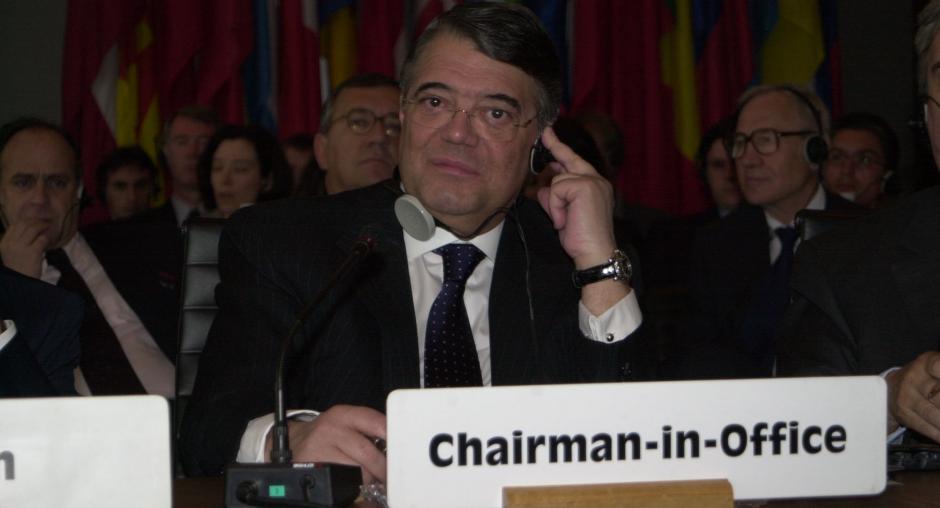Newsroom
OSCE at important moment in its evolution, says new Chairman-in-Office
VIENNA 2 May 2002

Chairman-in-Office: It is of utmost importance that the OSCE maintains its role in preventive diplomacy. (Ayhan Evrensel/OSCE) Photo details
VIENNA, 2 May 2002 - The new Chairman-in-Office of the OSCE, Portuguese Foreign Minister Antonio Martins da Cruz, said on Thursday that the Organization was at an important moment in its evolution but stressed that it should remain an effective forum for ensuring peace, stability and prosperity.
In his first address to the Permanent Council of the 55-nation Organization for Security and Co-operation in Europe in Vienna, he said it was of utmost importance that the OSCE maintained its role in preventive diplomacy while responding to new challenges in international security.
"The OSCE is at an important moment of its evolution", said Minister Martins da Cruz, who took up his office on 6 April after the change of government in Portugal following general elections in March. "The OSCE is and should remain an effective forum for dialogue and co-operation in a Euro-Atlantic area united around the ultimate goal of ensuring peace, stability and prosperity to our fellow citizens."
The comprehensive approach to security - embracing the economic and environmental dimension, human dimension and politico-military dimension - should remain a key feature of the organization.
Minister Martins da Cruz said that having identified the fight against terrorism as a central priority, the OSCE was working on the development of an OSCE Charter on the Prevention and Fight Against Terrorism. He looked forward to a 12 June meeting in Lisbon of leaders of international and regional organizations involved in the fight against terrorism. He was eagerly awaiting concrete projects in four strategic areas: policing, border control, trafficking and money laundering.
The Chairman-in-Office said: "Collaboration between the OSCE and the European Union should be improved. Conflict prevention, crisis management and post-conflict rehabilitation are areas of convergence where we should drive forward common actions."
Surveying developments in the OSCE area, he expressed his satisfaction with developments in south-eastern Europe, but warned that "peace and stability in the region are yet at an initial phase and can be undermined".
Speaking about recent developments in the relationship between the OSCE and Belarus, Minister Martins da Cruz said that the Chairmanship had employed all efforts to pursue a fruitful dialogue, but expressed his regret that this co-operative spirit had not been reciprocated.
The Chairman-in-Office said that he was confident of resuming dialogue in Moldova between the involved parties, and urged all sides to work together on finding a definition of Transdniestria's political status within a unified Moldova.
In Georgia, the OSCE had played a remarkable role. "The Border Monitoring Operation is a clear success of the OSCE, a practical example of conflict prevention."
Minister Martins da Cruz also said that he was pleased to see "that reason and good sense" had prevailed in Abkhazia. He gave his full support to efforts by the Co-Chairs of the Minsk Group to find a political resolution of the Nagorno-Karabakh conflict.
In his first address to the Permanent Council of the 55-nation Organization for Security and Co-operation in Europe in Vienna, he said it was of utmost importance that the OSCE maintained its role in preventive diplomacy while responding to new challenges in international security.
"The OSCE is at an important moment of its evolution", said Minister Martins da Cruz, who took up his office on 6 April after the change of government in Portugal following general elections in March. "The OSCE is and should remain an effective forum for dialogue and co-operation in a Euro-Atlantic area united around the ultimate goal of ensuring peace, stability and prosperity to our fellow citizens."
The comprehensive approach to security - embracing the economic and environmental dimension, human dimension and politico-military dimension - should remain a key feature of the organization.
Minister Martins da Cruz said that having identified the fight against terrorism as a central priority, the OSCE was working on the development of an OSCE Charter on the Prevention and Fight Against Terrorism. He looked forward to a 12 June meeting in Lisbon of leaders of international and regional organizations involved in the fight against terrorism. He was eagerly awaiting concrete projects in four strategic areas: policing, border control, trafficking and money laundering.
The Chairman-in-Office said: "Collaboration between the OSCE and the European Union should be improved. Conflict prevention, crisis management and post-conflict rehabilitation are areas of convergence where we should drive forward common actions."
Surveying developments in the OSCE area, he expressed his satisfaction with developments in south-eastern Europe, but warned that "peace and stability in the region are yet at an initial phase and can be undermined".
Speaking about recent developments in the relationship between the OSCE and Belarus, Minister Martins da Cruz said that the Chairmanship had employed all efforts to pursue a fruitful dialogue, but expressed his regret that this co-operative spirit had not been reciprocated.
The Chairman-in-Office said that he was confident of resuming dialogue in Moldova between the involved parties, and urged all sides to work together on finding a definition of Transdniestria's political status within a unified Moldova.
In Georgia, the OSCE had played a remarkable role. "The Border Monitoring Operation is a clear success of the OSCE, a practical example of conflict prevention."
Minister Martins da Cruz also said that he was pleased to see "that reason and good sense" had prevailed in Abkhazia. He gave his full support to efforts by the Co-Chairs of the Minsk Group to find a political resolution of the Nagorno-Karabakh conflict.
